That is the final month in my year-long Foundations undertaking. The main target of this month was service. On this submit, I’d wish to share some takeaways from the ten books I learn this month. Subsequent week I’ll share my reflections on attempting to enhance this basis in my very own life.
These may take a look at my studying lists from the earlier foundations: health, productiveness, cash, meals, studying, outreach, sleep, reflection, connection, focus and group. (102 books in whole!)
The 1-Minute Abstract of What I Discovered
The info are placing:
- Giving is nice. Serving to makes you happier and more healthy, and givers rank on the prime of a lot of life’s success ladders.
- We might give much more. Whereas we have a tendency to emphasise home inequality in our media protection, world inequality really placing. Most Individuals are within the prime 10% of the world revenue distribution—and also you don’t must really feel notably wealthy to be within the prime 1%. Obligations apart, it’s undoubtedly attainable that folks in Western nations might give considerably greater than the 1-2% they sometimes do.
- Our giving could possibly be much more efficient. Of what little we do give, lots of it’s wasted. Not a lot by outright fraud, however as a result of we’re lazy thinkers in relation to charity. A whole lot of well-meaning concepts don’t work notably nicely, and the handiest ones are orders of magnitude extra useful than the remainder.
In short, it looks like we not solely fail to be sufficiently beneficiant for others’ sake, however even for our personal sake. Altruism is undersupplied.
The three-Minute Abstract of What I’m Nonetheless Confused About
Whereas the info are clear, the philosophy will not be. This month’s studying raised extra questions than it answered.
Luckily, at a sensible degree, I don’t suppose it issues a lot. The standard particular person (myself included) can achieve this a lot easy good that getting the philosophy proper isn’t essentially the most urgent problem. Nonetheless, since what it means to assist others is, partly, a query about what makes life good and significant itself, the questions will not be mere educational pedantry.
Some questions I don’t have a substantial amount of certainty about:
- How a lot ought to we worth ourselves versus others? Neutral utilitarianism, which doesn’t give room for favoring oneself or one’s mates or household, appears excessively demanding, each compared to our commonsense morality (by which our duties to others hardly ever transcend our quick neighborhood), in addition to in comparison with what appears psychologically achievable for most individuals.
- How a lot ought to we worth mates versus strangers? Home versus world giving has turn into a hot-button subject, however, just like the weighing of self-interest, it appears troublesome to provide a transparent reply to the query of what we owe our neighbors versus individuals far-off.
- How a lot ought to we worth animals versus individuals? And what sorts of animals rely for extra (or for much less)? Intuitions range extensively right here, and it appears arduous to give you a transparent reply. Maybe we should always deal with animals higher (perhaps even a lot higher) than we at present do. Nevertheless it appears nearly absurd to argue that saving shrimp issues greater than world poverty.
- How a lot ought to we worth future individuals? Economists are sometimes at odds with altruists, noting that whereas redistribution advantages us now, extraordinarily excessive ranges of taxation could retard development, which is in the end the one factor that has actually triggered societies to flee long-term poverty. What we owe future individuals is a surprisingly thorny problem, particularly if our actions immediately imply that absolutely totally different units of individuals will find yourself being born consequently.
One risk is that these questions merely don’t have an goal reply. Philosophy is a dialog we’ve been having for over two millennia, and maybe we’ll preserve having it with out arriving at any solutions which have final justifications.
One other risk is that, as arduous as it might be, these questions could also be answerable, however we merely lack a number of the data or intelligence to reply them immediately. Maybe morality is ready for its Newton to unite the theories each in Heaven and on Earth.
Fast Opinions of the ten Books
1. Doing Good Higher by William MacAskill
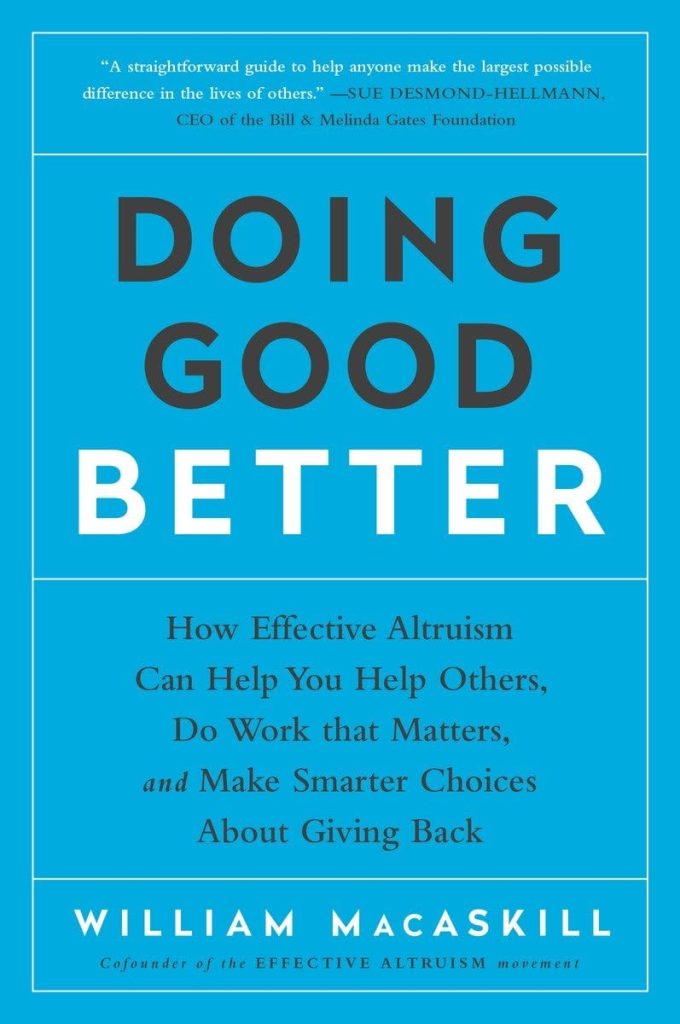
MacAskill opens with the story of an engineer who watches a poor lady working vigorously at a hand pump to get water from a nicely. He will get the thought to show the hand pump right into a play set. The children will get to play, and the townspeople will get water with out laborious effort. The concept is lauded and raises hundreds of thousands, together with outstanding celeb donations.
Besides the thought sucks. The ladies want the hand pump and the youngsters don’t wish to play on the set. It breaks regularly and might’t be repaired besides by technicians from the charity.
In distinction, deworming children—one thing that may be performed for just a few cents—creates monumental features to well being and schooling.
Once we spend cash for ourselves, we are usually pretty rational. Sure, we typically waste cash on junk or fail to find out about merchandise that may profit us. However, on the entire, we’re strongly motivated to get essentially the most for our cash. Nonetheless, after we spend cash on behalf of others, we regularly fall sufferer to the play-pump drawback—we hear good-sounding tales and open our wallets with out asking if it truly helps anybody.
MacAskill, one of many founders of efficient altruism, thinks we might be a lot better at serving to. By evaluating the impression of altruistic causes, we will determine charitable efforts that do rather more good.
2. A Yr of Residing Generously by Lawrence Scanlan
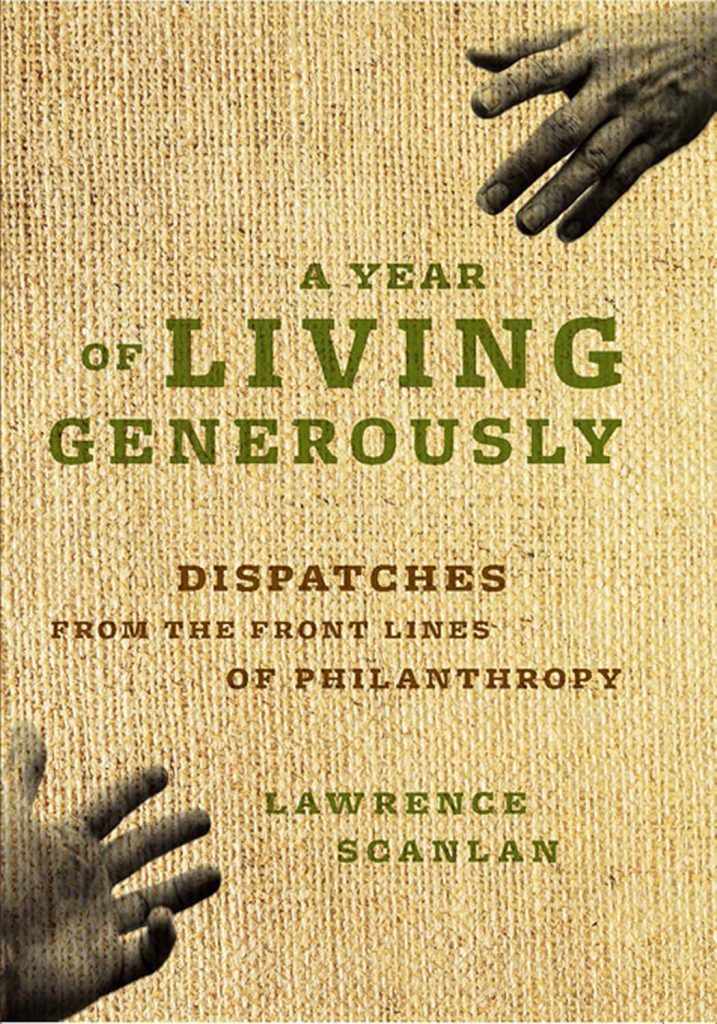
Scanlan spent a yr volunteering, Every month, he labored for a distinct charitable trigger, starting from serving to the homeless, to educating First Nations youth, to rehabilitating criminals, to serving to in a nursing residence.
This e-book’s first-person storytelling was a very good distinction to MacAskill’s indifferent financial evaluation. It’s clear that even when volunteering is much less “environment friendly” by way of cost-benefits, instantly serving to others might be good for forming one’s character and cultivating bonds that bridge teams and circumstances. For that, I applaud Scanlan.
On the identical time, I discovered myself disagreeing with lots of Scanlan’s arguments. He regularly disparages those that give financially, both as a result of they’ve loads (and subsequently should have been taxed closely as a substitute) or as a result of they really feel pleased with their generosity (which condescends those that are needier). On the identical time, Scanlan shrugs off predatory habits amongst those that ask for assist, akin to one one who lies to the operator of a meals financial institution about needing cash for an emergency, however then merely pockets the cash as a substitute.
I believe the guts of our disagreement comes down as to if you consider the system we stay in our society is a web constructive (as I do), and we have to make incremental reforms to assist the individuals who miss out; or whether or not you consider our present system is essentially corrupt, and thus one’s profitable participation in it’s a signal of 1’s sins.
Regardless of our differing worldviews, I nonetheless discovered Scanlan’s survey of volunteerism to be a helpful information to understanding how we would domesticate a extra service-oriented character.
3. Give and Take by Adam Grant
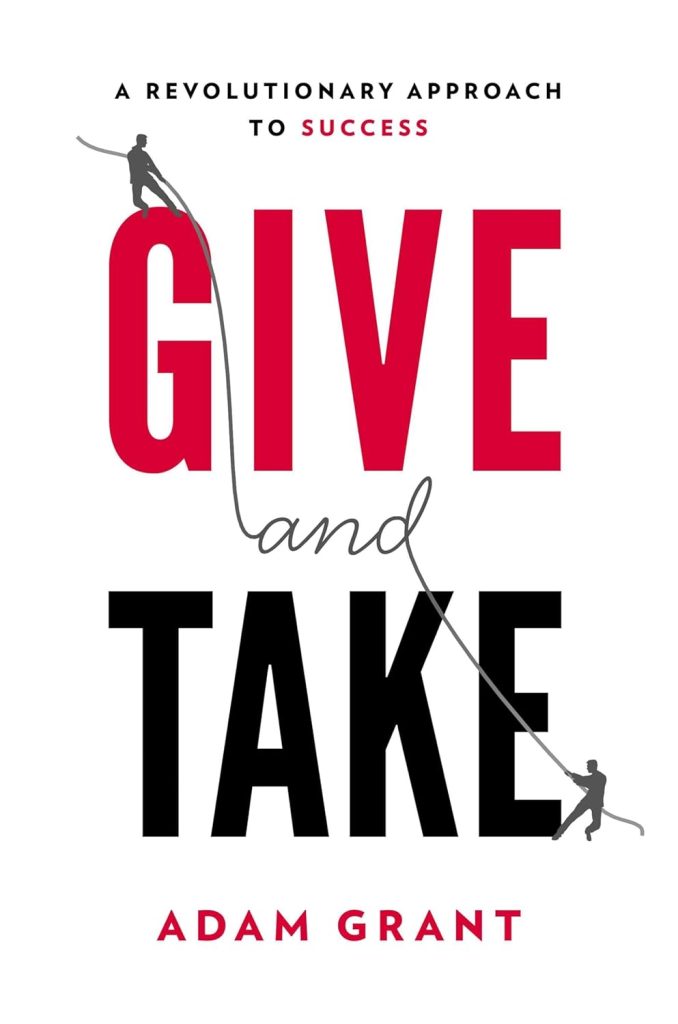
Measure efficiency amongst a bunch of individuals: college students, salespeople or professionals. Then give them a character stock that probes their reciprocity fashion: are they beneficiant givers, aggressive takers, or tit-for-tat matchers? What you’ll discover is that the givers are usually on each the underside and the highest of such rankings. Regardless of their fame for being doormats, beneficiant givers truly do fairly nicely within the cutthroat world of enterprise {and professional} life.
Generosity is a method that pays of within the long-term. Within the short-term, serving to can undermine your personal work. However, over time, it cultivates mates and allies that find yourself being price way over the hassle required to generate them. A highly-competitive “taker” technique tends to be short-sighted. However so, too, are the cautious “matchers” who search to assist after they can clearly understand your capacity to reciprocate. This strategy is just too cautious, akin to the start-up investor who is barely prepared to provide cash to firms which can be already turning a revenue. By giving generously when a reciprocated favor will not be on the horizon, givers handle to domesticate deeper networks that win out in the long term.
4. What We Owe the Future by William MacAskill
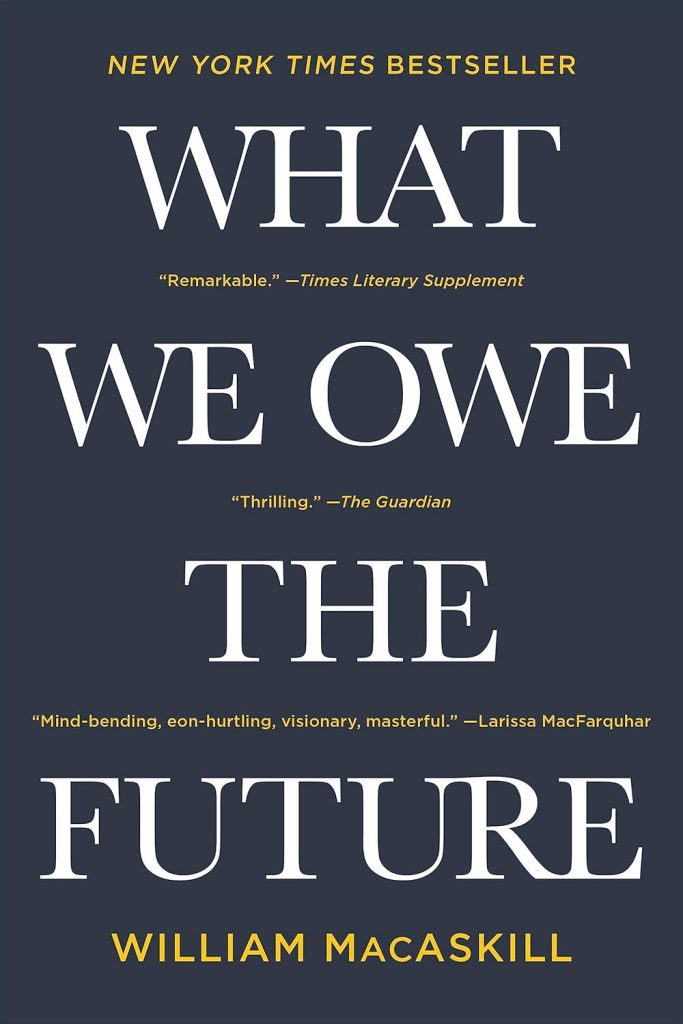
We stay in a hinge level in historical past. It’s not implausible to think about that, maybe centuries from now, our descendants will colonize the celebrities, and we could quantity within the trillions. On the identical time, catastrophic local weather change, rogue AI, bioengineered pandemics and nuclear conflict all threaten to deliver our species’ story to an abrupt finish.
Whereas such speculations could look like the stuff of science fiction, MacAskill makes the case that, to the extent that we have now some management over the path the long run takes, these actions could have, in ethical phrases, far, far larger impression than something that helps an individual alive immediately.
Along with existential threat, MacAskill additionally discusses the potential contingency of ethical attitudes. He provides the instance of slavery, arguing that, had it not been from the early advocacy of Quaker abolitionists like Benjamin Lay, the world’s oldest establishment may need legally continued up till the current day. Whereas Lay was hated and ridiculed in his personal time, if his actions nudged the ethical arc of the universe, it might have been one of many extra beneficent actions any human has ever taken.
I loved this e-book, nevertheless it was definitely extra speculative than Doing Good Higher. Ultimately, the rationale to care much less in regards to the future might not be that it issues much less, however merely that there’s an excessive amount of uncertainty in our capacity to reliably trigger a greater future.
5. Cussed Attachments by Tyler Cowen
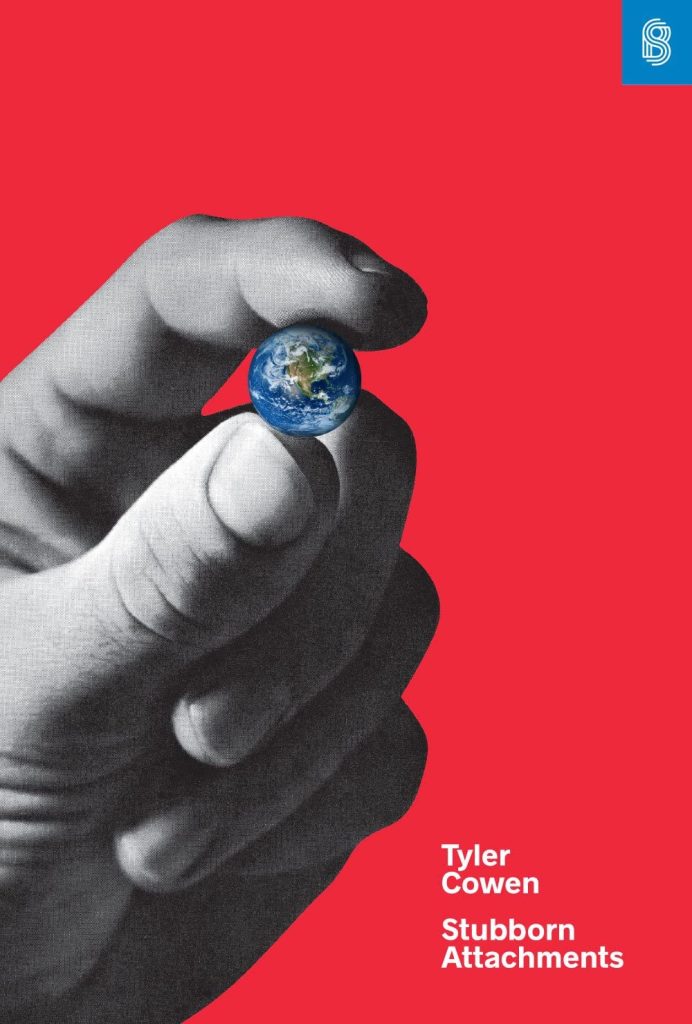
Cowen makes an analogous case to MacAskill that we should worth the far future rather more than we do presently. Nonetheless, in contrast to MacAskill’s science fiction hypotheticals, this principally boils all the way down to Cowen’s dedication to the concept that we ought to maximise sustainable financial development, constrained by some minimal set of human rights.
Financial development, not worldwide support, in spite of everything, might be the one factor that has ever sustainably lifted individuals out of poverty.
I don’t suppose that’s an argument towards giving strategically. Deworming, for example, doesn’t simply make youngsters more healthy, it additionally raises academic attainment which is conducive to a extra economically productive society. Nonetheless, it’s, maybe, an argument towards actions that may assist individuals immediately on the expense of future development, akin to discouraging overseas direct funding or boycotting factories overseas on account of their working situations.1
6. The Idea of Ethical Sentiments by Adam Smith
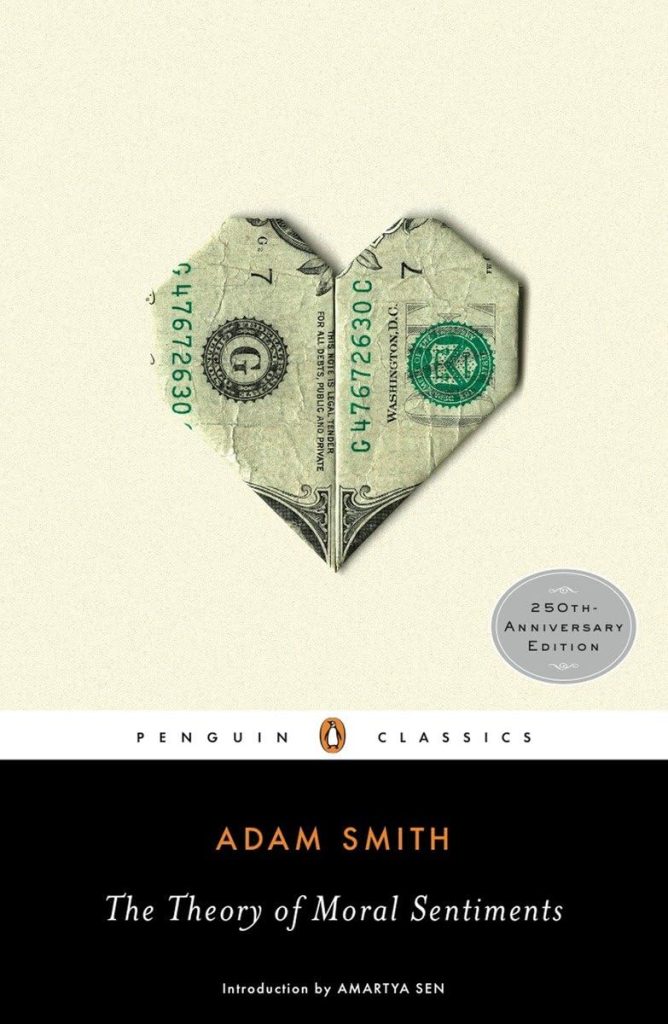
Whereas Smith is greatest identified for launching the sphere of economics along with his e-book The Wealth of Nations, his first main work was in regards to the origin of our ethical intuitions.
Smith argues that our ethical sentiments come primarily from “sympathy” (what we immediately would name empathy). By placing ourselves within the different individuals’ scenario, we reply to it as they do and decide their habits accordingly. By means of socialization, we not solely study to empathize with others, however to reflexively empathize with a hypothetical, neutral bystander who may witness our case and, in doing so, average our instinctive tendencies to magnify our personal self-importance.
Some philosophers, owing to their analytical natures, learn nearly like Martians—observing humanity with near-alien detachment. Smith, regardless of his bookish character (students debate whether or not he died a virgin), was the exact opposite: an extremely eager observer of human nature, choosing up on subtleties in our emotions and conduct. He wryly observes the unimaginable egotism baked into human nature:
Allow us to suppose that the good empire of China, with all its myriads of inhabitants, was immediately swallowed up by an earthquake, and allow us to take into account how a person of humanity in Europe, who had no kind of reference to that a part of the world, can be affected upon receiving intelligence of this dreadful calamity. He would, I think about, to start with, specific very strongly his sorrow for the misfortune of that sad individuals, he would make melancholy reflections upon the precariousness of human life, and the vainness of all of the labours of man, which might thus be annihilated in a second.
…
Essentially the most frivolous catastrophe which might befall himself would event a extra actual disturbance. If he was to lose his little finger tomorrow, he wouldn’t sleep tonight; however supplied he by no means noticed them, he would ignore with essentially the most profound safety over the wreck of 100 million of his brethren, and the destruction of that immense multitude appears plainly an object much less attention-grabbing to him than this paltry misfortune of his personal.
7. In opposition to Empathy by Paul Bloom
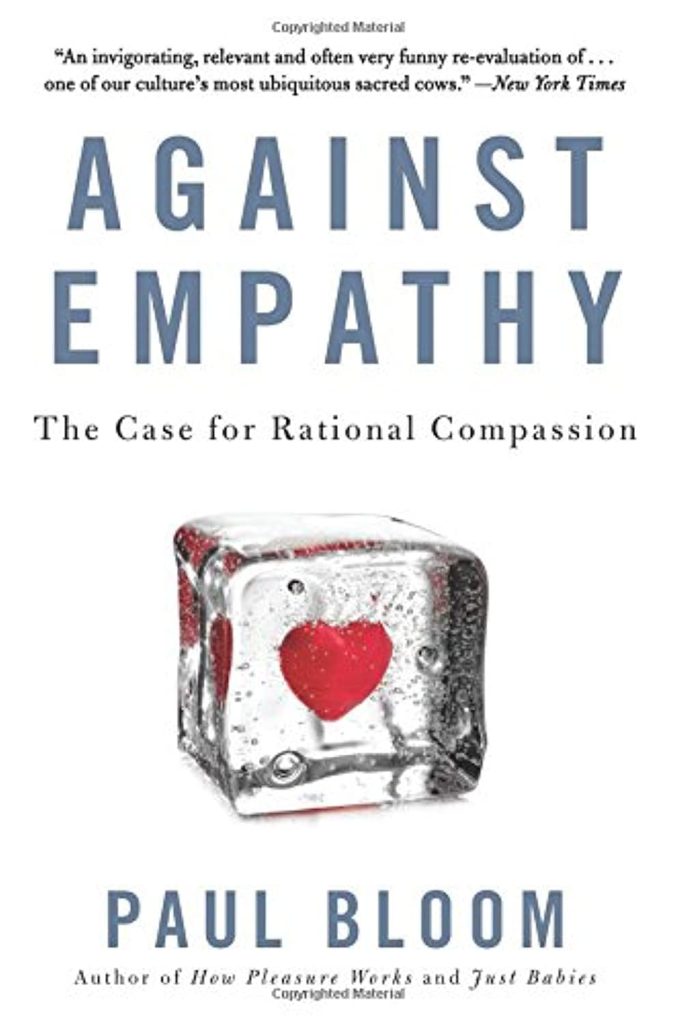
Bloom thinks empathy is a morally corrosive pressure, and we’d be higher if we stopped utilizing it.
Bloom argues that empathy distorts, biases, neglects scope and discourages reflection. Compassion and purpose are higher guides to altruistic habits.
My first impression, particularly as I learn this e-book instantly after Smith’s Sentiments, was that Bloom was deeply incorrect and mistaken. Empathy is the grounding for our ethical intuitions, and whereas it might be imperfect, being coldly rational looks like a straight path to changing into a merciless psychopath.
However Bloom largely gained me over. He makes a very good case that empathy will not be, in truth, what underpins a lot of our ethical behaviors. We regularly do good issues the place there is no such thing as a sufferer to empathize with. Feeling a struggling particular person’s ache will not be essential to treatment it, and might regularly get in the best way.
8. Causes and Individuals by Derek Parfit
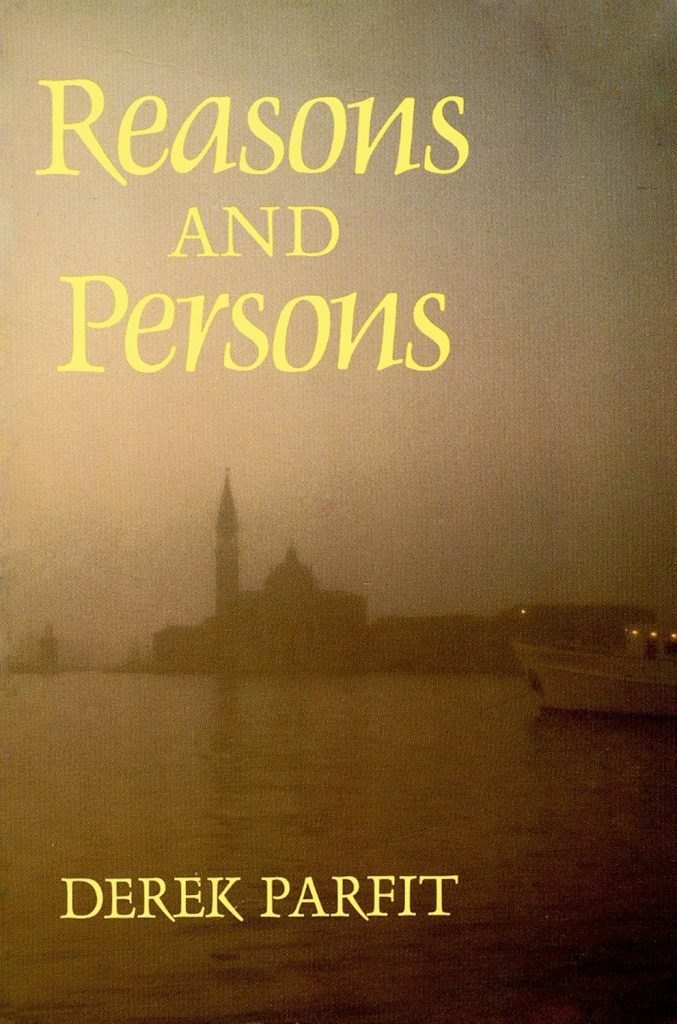
Parfit is taken into account some of the necessary ethical philosophers of the twentieth century, and Causes and Individuals is maybe his biggest e-book.2
Parfit fastidiously works by arguments to reach on the following conclusions:
- We should always reject self-interest. The speculation of self-interest, specifically, that it’s rational to do no matter is greatest for one’s life, is collectively self-defeating (due to recreation concept) and not directly, individually self-defeating (as a result of we would stay higher if our motivations weren’t so self-interested). Additionally it is troublesome to defend the notion that it’s irrational to do what would hurt one’s future self, however rational to do what would hurt one other particular person.
- Private identification is lower than it appears. There isn’t a Cartesian ego. What it means to be an individual, prolonged over time, is the continuation of many psychological elements over time. This implies we shouldn’t concern Star Trek-style teleportation (ought to it someday be invented). Nevertheless it additionally means we’re lower than 100% similar with our future selves, and greater than 0% overlapping with different individuals, and will concern demise lower than we do immediately.
- Deciding what’s greatest over the long-haul is difficult. Each motion causes not simply advantages and harms to the long run, but additionally creates fully totally different units of people that can be born on this planet. It’s troublesome (maybe not possible) to assemble a concept of what we should always try this offers with this truth, and in addition avoids the repugnant conclusion {that a} sufficiently giant world of individuals whose lives are barely price dwelling is healthier than a world with the identical inhabitants as ours that lives in utopia.
9. Ethics within the Actual World by Peter Singer
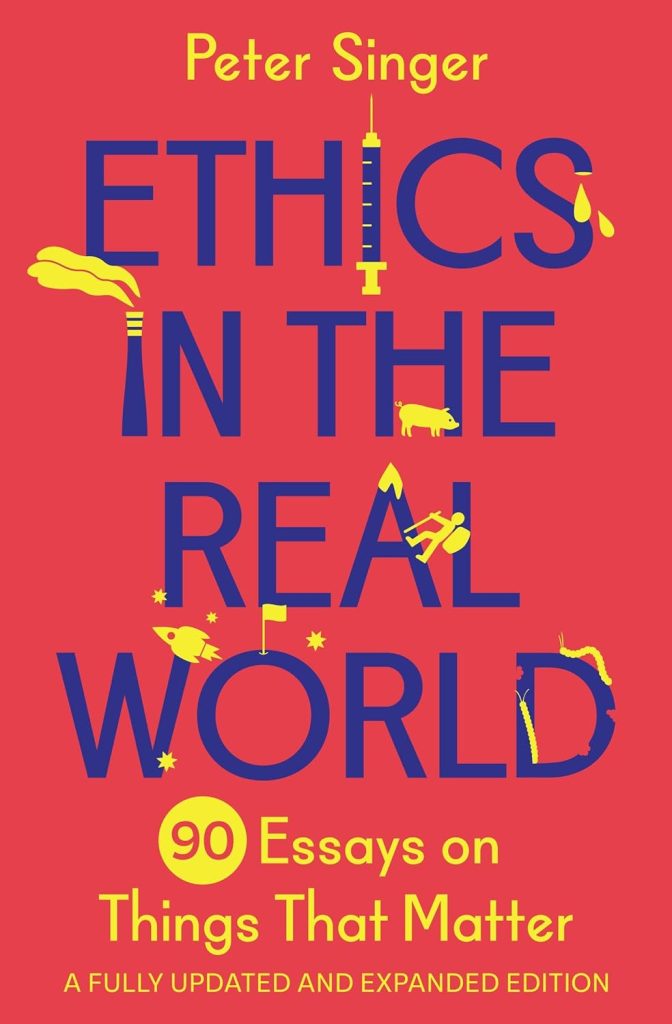
This can be a assortment of essays by Singer. It covers a spread of controversial points in ethics:
- Do bugs really feel ache?
- Is grownup incest essentially immoral?
- Ought to we permit individuals to promote their kidneys?
- Have been vaccine mandates a violation of non-public freedom?
- Do residents of Western nations have an ethical obligation to provide a lot of their revenue to charity?
Thought-provoking, even when I don’t all the time agree with Singer’s conclusions.
10. Man’s Seek for That means by Viktor Frankl
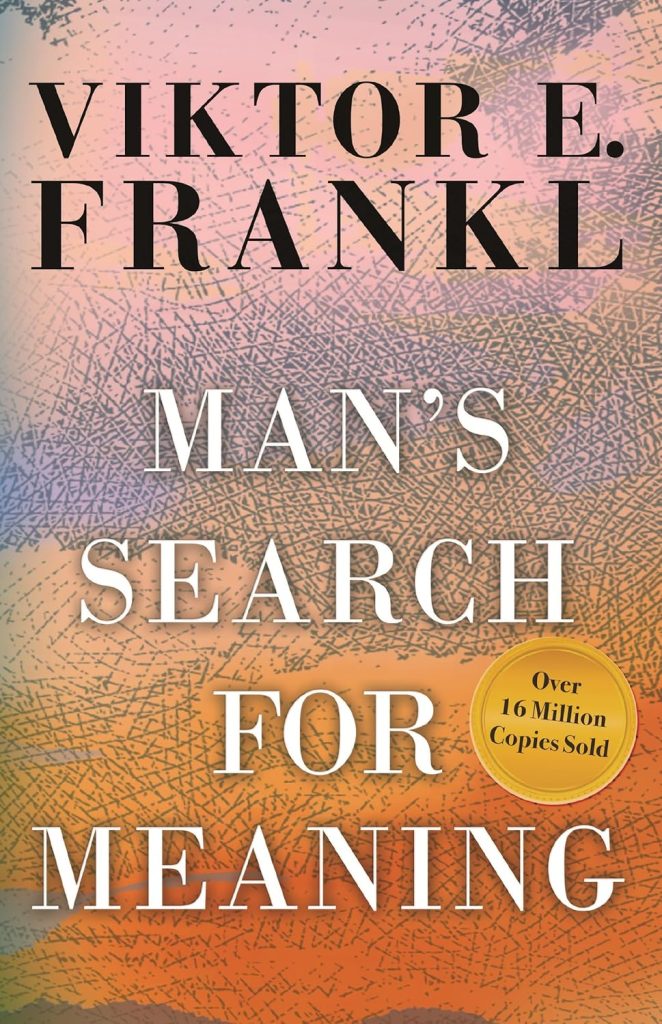
As a younger psychiatrist, Viktor Frankl and his whole household (together with his pregnant spouse) had been deported to focus camps. Solely Frankl survived.
Man’s Seek for That means is half an evaluation of the psychology of camp life, from the virtually unimaginable brutality of the guards, to the much more despicable habits of prisoners who collaborated. The opposite half is Frankl’s concept of psychology, which posits that human beings in the end search a that means for his or her actions, not merely pleasure (tempo Freud) or energy (tempo Adler).
Regardless of the horrors, Frankl decides that there’s a potential that means in each expertise, and it’s our activity in life to seek out it. The focus camps, then, function an excessive take a look at case for this concept of life—of our capacity to seek out that means that may permit us to transcend our circumstances.
Frankl writes:
“We needed to study ourselves and, moreover, we needed to educate the despairing males, that it didn’t actually matter what we anticipated from life, however fairly what life anticipated from us. We would have liked to cease asking in regards to the that means of life, and as a substitute to consider ourselves as those that had been being questioned by life—every day and hourly.
…
Life in the end means taking the duty to seek out the fitting reply to its issues and to meet the duties which it continually units for every particular person.
These duties, and subsequently the that means of life, differ from man to man, and from second to second. Thus, it’s not possible to outline the that means of life in a basic manner. Questions in regards to the that means of life can by no means be answered by sweeping statements. “Life” doesn’t imply one thing obscure, however one thing very actual and concrete, simply as life’s duties are additionally very actual and concrete.”
_ _ _
Subsequent week, I’ll share some private reflections by myself month of service, and the way I attempted to use a few of these concepts, nonetheless imperfectly, in my very own life.
Footnotes
- The argument right here is that even when “sweat store” working situations are appalling by developed-country requirements, they’re normally higher than the choice of subsistence agriculture (as evidenced by the demand for such jobs). Moreover, these jobs type an early rung on the ladder of financial improvement that may permit a rustic to climb up the financial ladder to self-sufficiency.
- On What Issues being his different magnum opus.




